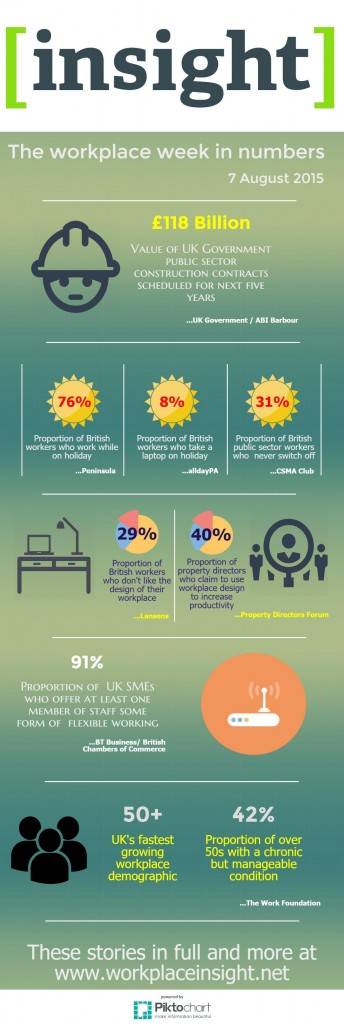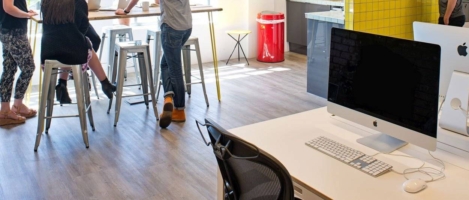August 6, 2015
Search Results for: workplace
August 5, 2015
Proofs of the link between workplace design and productivity? Here are three
by Charles Marks • Case studies, Facilities management, News, Wellbeing, Workplace design
 Three new studies have joined the already extensive body of work linking workplace design and productivity. The most extensive is the research carried out by communications consultancy Lansons which looks at every aspect of the British workplace to uncover the experiences and most commonly held perceptions of around 4,500 workers nationwide. The study is broken down into a number of sections which examine topics such as workplace design, wellbeing, job satisfaction, personal development and leadership. The second is a study from the Property Directors Forum which explores the experiences of occupiers and finds a shift in focus away from cost reduction and towards investing to foster employee productivity. The final showcases the results of a post occupancy survey conducted by National Grid following the refurbishment of the firm’s Warwick headquarters by AECOM.
Three new studies have joined the already extensive body of work linking workplace design and productivity. The most extensive is the research carried out by communications consultancy Lansons which looks at every aspect of the British workplace to uncover the experiences and most commonly held perceptions of around 4,500 workers nationwide. The study is broken down into a number of sections which examine topics such as workplace design, wellbeing, job satisfaction, personal development and leadership. The second is a study from the Property Directors Forum which explores the experiences of occupiers and finds a shift in focus away from cost reduction and towards investing to foster employee productivity. The final showcases the results of a post occupancy survey conducted by National Grid following the refurbishment of the firm’s Warwick headquarters by AECOM.
August 1, 2015
Insight Weekly on GenY, digital workplaces, productivity and more
by Sara Bean • Flexible working, Newsletter, Public Sector, Technology, Workplace
 In this week’s issue; three new studies have joined the already extensive body of work linking workplace design and productivity; how business practices and the way people use technology vary across sectors; and over half of US workers say the 9 to 5 day is an outmoded concept. Amanda Sterling argues social media at work can help shift the power dynamic from the few to the many; Gary Chandler explains how workplace design can express a firm’s culture and Mark Eltringham explores what the Midwich Cuckoos can tell us about Generation Y. The Government challenges businesses to consider the boost untapped disabled talent could bring to their workforce and CoWorking giant WeWork looks to acquire over 1 million sq. ft. of space in London. Subscribe for free quarterly issues of Work&Place and weekly news here, follow us on Twitter and join our LinkedIn Group to discuss these and other stories.
In this week’s issue; three new studies have joined the already extensive body of work linking workplace design and productivity; how business practices and the way people use technology vary across sectors; and over half of US workers say the 9 to 5 day is an outmoded concept. Amanda Sterling argues social media at work can help shift the power dynamic from the few to the many; Gary Chandler explains how workplace design can express a firm’s culture and Mark Eltringham explores what the Midwich Cuckoos can tell us about Generation Y. The Government challenges businesses to consider the boost untapped disabled talent could bring to their workforce and CoWorking giant WeWork looks to acquire over 1 million sq. ft. of space in London. Subscribe for free quarterly issues of Work&Place and weekly news here, follow us on Twitter and join our LinkedIn Group to discuss these and other stories.
July 31, 2015
The latest type of space adopted as a workplace by British workers? The pub
by Mark Eltringham • Flexible working, News, Technology
We’re used to the sight of workers colonising coffee shops, parks and hotels as ad hoc workplaces. Now, a growing number of British workers are firing up their laptops in pubs, and are demanding free WiFi and (apparently) a cup of decent coffee while they do so. According to the latest Greene King Leisure Spend Tracker, over a quarter of Brits would like to log on to get some work done from the pub. According to the report, the findings reaffirm the pivotal role pubs continue to play at the heart of the community and their ability to adapt to the changing needs of customers, including those who see the whole world as an untapped place of work. Fiona Gunn, Greene King’s marketing director, said: “With flexible working on the rise, increasing numbers of people are now using the pub as a ‘third space’ establishing the pub as not just a second home but a place of work as well.”
July 28, 2015
Beyond branding – how workplace design can express a firm’s culture
by Gary Chandler • Comment, Facilities management, Workplace, Workplace design
 When it comes to the incorporation of branding and identity into a workplace, there is a simple option, which is to produce a design that faithfully incorporates the firm’s logos, colours and straplines in the interior. There’s nothing wrong with this, except for the fact that it is literally superficial and so may miss the opportunity to create an office design that scratches beneath the surface to reveal what lies beneath. When you get past the layers of branding and identity, you uncover something that we call culture. This can take things to a whole new level because the challenge becomes how to create a workplace design that communicates and fosters both the identity and the culture of the organisation. The benefits to the organisation can be enormous, not least because this approach bridges a number of disciplines such as human resources and office design and so drives a number of strategic objectives.
When it comes to the incorporation of branding and identity into a workplace, there is a simple option, which is to produce a design that faithfully incorporates the firm’s logos, colours and straplines in the interior. There’s nothing wrong with this, except for the fact that it is literally superficial and so may miss the opportunity to create an office design that scratches beneath the surface to reveal what lies beneath. When you get past the layers of branding and identity, you uncover something that we call culture. This can take things to a whole new level because the challenge becomes how to create a workplace design that communicates and fosters both the identity and the culture of the organisation. The benefits to the organisation can be enormous, not least because this approach bridges a number of disciplines such as human resources and office design and so drives a number of strategic objectives.
July 27, 2015
Fifth of new mothers claim to experience workplace discrimination
by Sara Bean • Legal news, News, Workplace
 One in five new mothers experienced harassment or negative comments from their colleagues, employer or manager when pregnant or returning from maternity leave, a new report by the Equality and Human Rights Commission claims. It also found disturbing evidence that around 54,000 new mothers may be forced out of their jobs in Britain each year. The findings are based on a survey of over 3,200 women, in which 11 percent of the women interviewed reported having been dismissed, made compulsorily redundant where others in their workplace were not, or treated so poorly they felt they had to leave their jobs. If replicated across the population as a whole, this could mean as many as 54,000 women losing their jobs each year. Despite this perception, the majority of employers claimed they were firm supporters of female staff during and after their pregnancies and find it easy to comply with the law.
One in five new mothers experienced harassment or negative comments from their colleagues, employer or manager when pregnant or returning from maternity leave, a new report by the Equality and Human Rights Commission claims. It also found disturbing evidence that around 54,000 new mothers may be forced out of their jobs in Britain each year. The findings are based on a survey of over 3,200 women, in which 11 percent of the women interviewed reported having been dismissed, made compulsorily redundant where others in their workplace were not, or treated so poorly they felt they had to leave their jobs. If replicated across the population as a whole, this could mean as many as 54,000 women losing their jobs each year. Despite this perception, the majority of employers claimed they were firm supporters of female staff during and after their pregnancies and find it easy to comply with the law.
July 26, 2015
Insight Weekly on robots at work, agile working, workplace trends and more
by Mark Eltringham • Facilities management, Newsletter, Workplace, Workplace design
 In this week’s issue; how the majority of managers are more than happy to welcome robots into the workplace; a survey reveals how much extra work autonomous workers put in each week; Mark Eltringham argues we need to keep a sense of perspective about how important our work is; a groundbreaking UK public sector estate scheme is rolled out nationwide; a recent series of events draws out the key workplace trends from this year’s NeoCon exhibition; a new OECD report calls for more action on the emerging digital workplace; Sara Bean reports on the calls for the Government not to abandon its pledges on zero carbon buildings; and a survey reveals that the vast majority of women don’t feel they are discriminated against at work. Subscribe for free quarterly issues of Work&Place and weekly news here, follow us on Twitter and join our LinkedIn Group to discuss these and other stories.
In this week’s issue; how the majority of managers are more than happy to welcome robots into the workplace; a survey reveals how much extra work autonomous workers put in each week; Mark Eltringham argues we need to keep a sense of perspective about how important our work is; a groundbreaking UK public sector estate scheme is rolled out nationwide; a recent series of events draws out the key workplace trends from this year’s NeoCon exhibition; a new OECD report calls for more action on the emerging digital workplace; Sara Bean reports on the calls for the Government not to abandon its pledges on zero carbon buildings; and a survey reveals that the vast majority of women don’t feel they are discriminated against at work. Subscribe for free quarterly issues of Work&Place and weekly news here, follow us on Twitter and join our LinkedIn Group to discuss these and other stories.
July 23, 2015
Majority of managers are ready to welcome robots in the workplace
by Mark Eltringham • News, Technology, Workplace
The relationship between mankind and the beings it creates has been a staple of science fiction ever since Mary Shelley first dreamt up her tale of Frankenstein and his creature. It’s an enduring idea because it poses questions about the nature of life and what it means to be human. We’re now about to address those questions in real life for the first time and we’ll need to address their mundane as well as profound implications, including the advent of robots in the workplace. As things stand, the problem is that you can come up with any answer you like to these questions because, for every report that a robot has displayed a degree of self awareness, another will tell you about a robot in Germany crushing a man to death. And for every piece of footage disconcertingly showing a robot learning to clear hurdles like an Arab stallion, you can find dozens of them falling over like drunks.
July 22, 2015
OECD nations need to urgently address the coming digital workplace
by Mark Eltringham • News, Technology, Workplace, Workplace design
 There is now an urgent need for the world’s growing number of digital economies to shift their focus to how they help people to manage their own transition to a new form of digital workplace. That is the main conclusion of a new report from the Organisation for Economic Co-operation and Development (OECD). The OECD Digital Economy Outlook 2015 claims that while most countries have moved from a narrow focus on communications technology to a broader digital approach, they now need to address the significant and growing risk of disruption in areas like privacy and jobs. The report – which covers areas from broadband penetration and industry consolidation to network neutrality and cloud computing in OECD countries says more should be done to offer information and communication technology (ICT) skills training to help people transition to new types of digital jobs.
There is now an urgent need for the world’s growing number of digital economies to shift their focus to how they help people to manage their own transition to a new form of digital workplace. That is the main conclusion of a new report from the Organisation for Economic Co-operation and Development (OECD). The OECD Digital Economy Outlook 2015 claims that while most countries have moved from a narrow focus on communications technology to a broader digital approach, they now need to address the significant and growing risk of disruption in areas like privacy and jobs. The report – which covers areas from broadband penetration and industry consolidation to network neutrality and cloud computing in OECD countries says more should be done to offer information and communication technology (ICT) skills training to help people transition to new types of digital jobs.
July 7, 2015
‘World’s healthiest workplace’ is unveiled in Melbourne
by Mark Eltringham • Architecture, Case studies, Environment, Wellbeing, Workplace design
 For some time now, the most talked about workplace issue has been wellbeing. Where once firms sought ways of using office design to solve a productivity puzzle, they are now increasingly concerned with the mental, psychological and physical health of employees. This is the case for most organisations but doubly so for those whose business is directly related to those issues, such as Melbourne based health insurance firm Medibank. The firm, Australia’s largest health insurer has moved to a new headquarters building in the Docklands district of the city and took the opportunity to create a space which it claims should be hardwired with the proactive principles of personal wellbeing and health with which its business is associated. The building has been designed by Hassell to meet these principles and includes a facility with outdoor sporting facilities, an edible garden and other green spaces.
For some time now, the most talked about workplace issue has been wellbeing. Where once firms sought ways of using office design to solve a productivity puzzle, they are now increasingly concerned with the mental, psychological and physical health of employees. This is the case for most organisations but doubly so for those whose business is directly related to those issues, such as Melbourne based health insurance firm Medibank. The firm, Australia’s largest health insurer has moved to a new headquarters building in the Docklands district of the city and took the opportunity to create a space which it claims should be hardwired with the proactive principles of personal wellbeing and health with which its business is associated. The building has been designed by Hassell to meet these principles and includes a facility with outdoor sporting facilities, an edible garden and other green spaces.
July 6, 2015
Humans will remain at the heart of the emerging digital workplace
by Maciej Markowski • Comment, Flexible working, Technology, Workplace design
 The speed of technological development over the last 30 years has been pretty mind blowing. Of course, some technologies came and went, for instance you would struggle finding fax machines in your office nowadays or people using Pagers to contact one another. It’s no wonder that in the early nineties futurologists predicted the death of the office. Technology was shaping the way we worked and was leading us away from office buildings towards a digital workplace. Yet videoconferencing hasn’t destroyed the need for business travel. Team meetings haven’t been abandoned because of messaging services like Yammer, Slack, Lync and Webex. We still do a lot of business face to face over coffee in a meeting room. Although technological advances have greatly improved the way we connect and do business, companies still appear to value human interaction.
The speed of technological development over the last 30 years has been pretty mind blowing. Of course, some technologies came and went, for instance you would struggle finding fax machines in your office nowadays or people using Pagers to contact one another. It’s no wonder that in the early nineties futurologists predicted the death of the office. Technology was shaping the way we worked and was leading us away from office buildings towards a digital workplace. Yet videoconferencing hasn’t destroyed the need for business travel. Team meetings haven’t been abandoned because of messaging services like Yammer, Slack, Lync and Webex. We still do a lot of business face to face over coffee in a meeting room. Although technological advances have greatly improved the way we connect and do business, companies still appear to value human interaction.
























September 2, 2015
We need to do more than pay lip service to workplace wellbeing 0
by Ann Clarke • Case studies, Comment, Wellbeing, Workplace design
(more…)